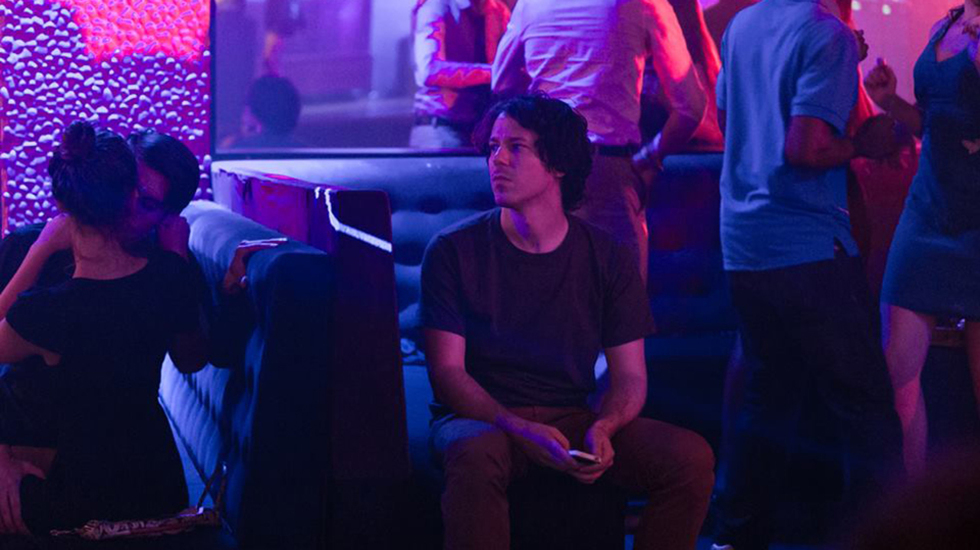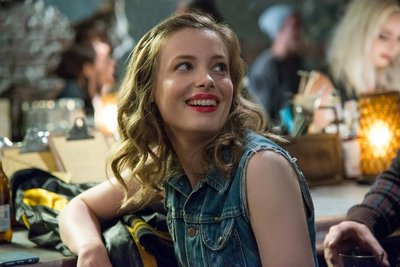
BY KAREN KEMMERLE |
Zachary Wigon on ‘The Heart Machine’ and How Technology Affects Intimacy In The Modern Age
We talk with Zachary Wigon about love and relationships among millennials and how Kickstarter will impact the indie film world even further in the future.

Our contributor Zachary Wigon (who writes our Racking Focus column, among other pieces) made a movie! His acclaimed feature debut, The Heart Machine, enjoyed its world premiere last month at the SXSW Film Festival. The film stars John Gallagher Jr. and indie darling Kate Lyn Sheil as Cody and Virginia, a couple who meets online and begins a romantic relationship, even though he’s in Brooklyn and she’s abroad in Berlin. As he discovers more and more holes in her stories, Cody’s growing fear that she may actually be living in NYC turns into obsession.
As the film tracks their parallel journeys, writer/director Zachary Wigon skillfully explores the ways that technology and isolation complicate modern romance. We recently spoke to Zach about the impetus behind his film, his characters’ motivations and why knowledge of cinematic history is essential for a filmmaker.
Tribeca: What inspired you to make The Heart Machine? Was it based on something you had experienced?
Zach Wigon: I was in a long-distance relationship for a while. It worked perfectly fine while we were communicating long distance over Skype. When she came back to New York, we realized it was clearly a bad match. So that led me to thinking, “what if you had a character that preferred a Skype relationship to a relationship in person - even if they didn’t have to opt for that?”
Tribeca: What do you think The Heart Machine says about the ways in which this generation deals with love and relationships?
ZW: There’s something self-defeating and counter-intuitive about compartmentalizing relationships and dating with the help of modern technology that we have. I feel like when you have an app like “Tinder” or “Blender”—where you’re separating sexual intimacy from emotional intimacy—something essential in what makes up the relationship is lost. Likewise, when you have a tech relationship you’re separating emotional intimacy from physical intimacy.
Of course, ironically, technology sometimes helps relationships to form. So it’s a little tricky, it’s a little paradoxical that technology both makes intimacy more difficult to achieve but easier to access simultaneously. I think it leads to dissatisfaction and confusion among young people who are trying to figure out what they want in a relationship.
I like the idea of using a crowdfunding site as a way to view pre-sales on a film.
Tribeca: This film is essentially a two-hander. How did John Gallagher Jr. and Kate Lyn Sheil come on to the project?
ZW: I wanted John to be in the film because I thought he was so great in The Newsroom and Short Term 12. He’s always very charming, very charismatic. I liked the idea of casting him a little bit against-type—casting someone really charming and likable to play this character that does some stuff that lies in a gray zone in terms of ethics and morality. I felt like the role pushed both his likability and un-likability and would be really interesting to view on screen a little like Jimmy Stewart in Vertigo. Luckily, he read the script and liked it.
I knew Kate a little bit because she and I went to college together. I saw her in Green, directed by Sophia Takal, and I thought she was wonderful in it. I wanted Kate because she can take a character who is going through emotional and psychological turmoil and convey feelings on her face and in a visually striking fashion.
Tribeca: Were you able to rehearse much with John and Kate before filming? How much of the dialogue in the film was scripted vs. improvised?
ZW: We had about a week of rehearsal before we shot the film. For three of those days, I worked with just John and Kate together. Those rehearsal days were really helpful in terms of getting them situated with the dynamics of their characters. Obviously, they faced the challenge of acting with each other over Skype , and they had to create the sense that these characters have a real relationship.
I think in the finished film maybe 10% of the dialogue is improvised. I encouraged it as much as I could. For the opening Skype scene, we ended up using stuff that was almost entirely improvised between the two of them.
Tribeca: Some of the most riveting scenes in the movie take place in front of a computer screen. How did you advise your actors on how to play these scenes?
ZW: First of all, John and Kate area really talented performers. The most important part of directing an actor is casting them, and that was really the case here. The rehearsals that we did allowed John and Kate to work face-to-face and build up a warmth and chemistry that they could fall back on when they did those Skype scenes. It never felt too emotionally distant. Plus, improvising definitely helped loosen them up.

Tribeca: How did you work with cinematographer Rob Leitzell to keep these scenes as visually dynamic as possible?
ZW: We decided early on that there was not a ‘magic-bullet solution’ to making glowing rectangles more visually interesting. We didn’t want to decide on one gimmick that carried through the film. We just wanted to try and find the most striking shot possible when we could.
For example, during the opening Skype scene, there’s a shot of the computer monitor in which you see Cody reflected in the monitor at the same time. There was no over-arching idea on how to shoot that stuff aside from “make each shot as visually exciting as it could be.”
Tribeca: I love how you took your time in telling your story and employed many long takes. Can you talk about working with editors Ron Bulin and Louise Ford to establish the pacing?
ZW: We wanted to play the film like a slow-burn thriller. Whether it’s a true thriller, I can’t say because I’m too deep inside it to categorize it like that. We wanted the film to feel tense every moment. That slow-burn feeling was very important to us, and taking our time with the pacing helped us to established suspense.
We decided early on that there was not a ‘magic-bullet solution’ to making glowing rectangles more visually interesting.
Tribeca: What do you think Cody’s real goal is with Virginia: to meet in person and confront her, or just confirm that she lied and move on?
ZW: I think he just has to know, and I think he’s in love with her and doesn’t really know what he’s going to do when he finds her. I think he knows that he has to find her, even though on a certain level he doesn’t want to find her. He’s conflicted.
Most importantly, I think he’s committed to the fantasy world that he has built around her that has been threatened by the potential betrayal. So it’s understandable that he becomes obsessed with the idea of figuring it out in the most roundabout way possible because he can’t just talk to her about it. He has no idea what to say because he’s afraid of it.
Tribeca: The Heart Machine was finished, in large part, because of your successful crowdfunding campaign. Could indie films function without crowdfunding nowadays?
ZW: I think the independent film could function without crowdfunding, but not as successfully. What’s interesting to me about Kickstarter is all the different avenues that will become open to filmmakers as Kickstarter and Indiegogo mature and as new crowdfunding sites pop up.
I like the idea of using a crowdfunding site as a way to view pre-sales on a film. It’s an interesting model that might allow people like me to pre-sell individual tickets and figure out in advance the budget and potential profits even before getting the film off the ground. Somebody’s going to figure out how to do that and make a lot of money.
It’s a little paradoxical that technology both makes intimacy more difficult to achieve but easier to access simultaneously.
Tribeca: This is your first feature length film, though you’ve been writing about films and making shorts (like Someone Else’s Heart). Did you learn any lessons while making short films that translated to the feature length filmmaking process?
ZW: Oh definitely. I think the biggest thing that I’ve learned over the course of making shorts is that information really can’t be entertainingly and successfully conveyed, at least cinematically, unless it’s conveyed visually. I made shorts in the past where important expositional information or plot information is conveyed through dialogue and often audience members don’t understand what happened.
So with The Heart Machine, almost all the information is conveyed visually. I tried to eliminate as much expositional dialogue as possible.
Tribeca: I think it’s interesting that you’re a young filmmaker who is also a writer. How vital is it for aspiring filmmakers to have a working knowledge of cinema history?
ZW: I hear where you’re coming from with that sentiment. Personally, I know a lot of independent filmmakers who do have a wonderful knowledge of cinema history, and I do believe that knowledge is essential because no film is made in a vacuum. Understanding the tradition of filmmaking that you’re coming from is a really good thing, and I don’t think it is possible to be influenced by too many things.
Tribeca: Being accessible to fans and film enthusiasts is something that is becoming more and more important for filmmakers if they want to get their projects out to their audiences. What do you get out of blogging/writing? How important is it to be an active voice in the indie film community?
ZW: Well, let’s put it this way. I don’t think it’s essential to write about films to be an independent filmmaker. I like being a part of a larger conversation though. I think the independent film industry is at a little bit of a crossroads right now and that a lot of things are going to change in the next couple of years. I want to spend the rest of my life working in independent film so I want to play as active a role as I can as the industry evolves and changes. It’s my life. It’s how I spend my time. So that’s why it works for me to be as involved as I can.

